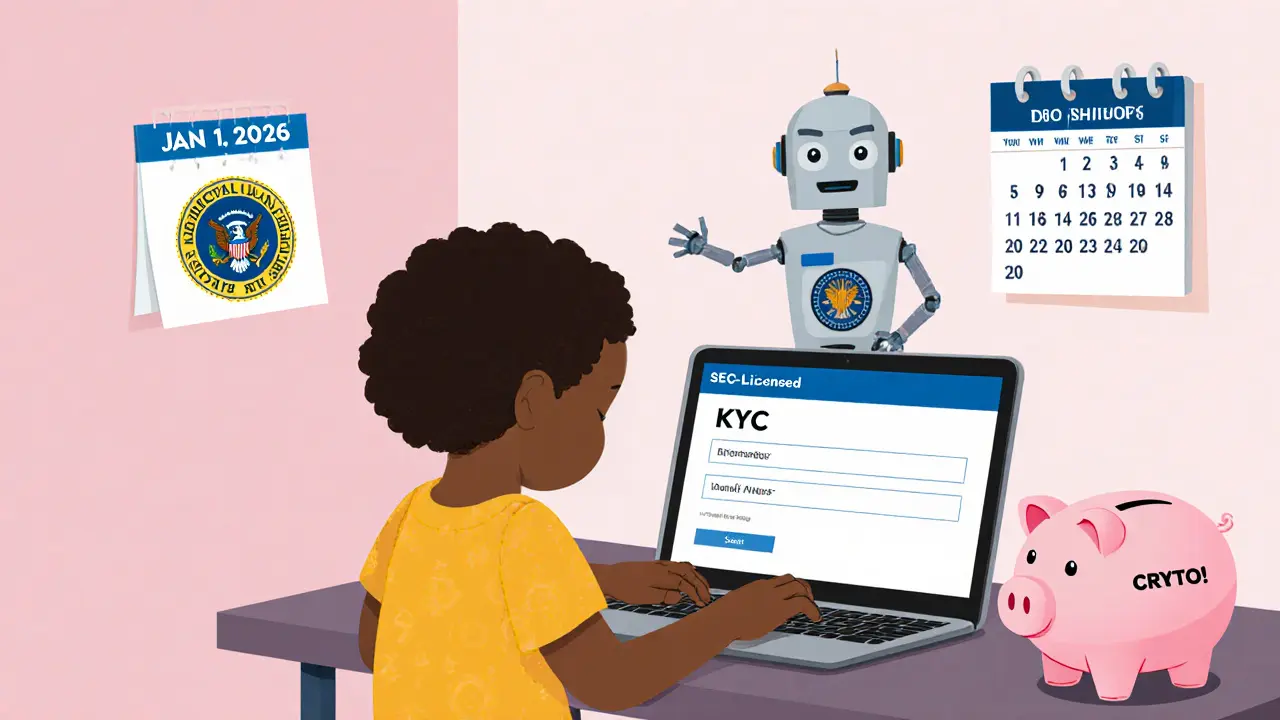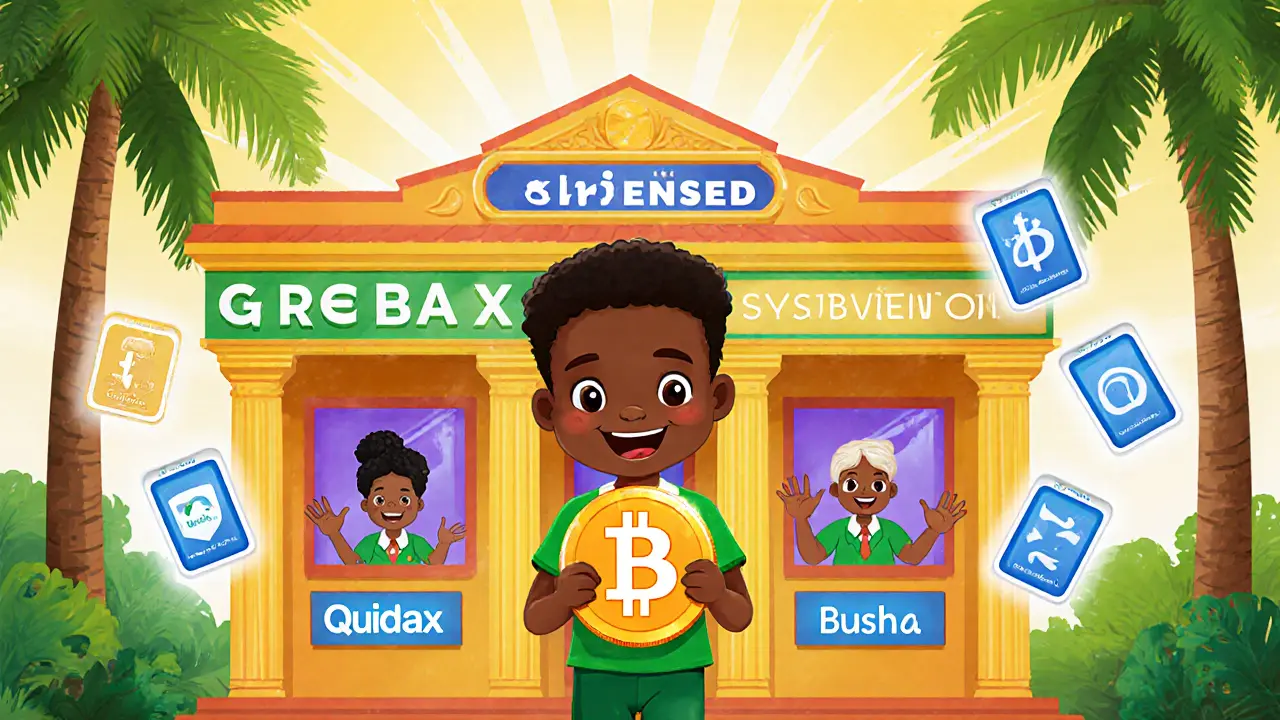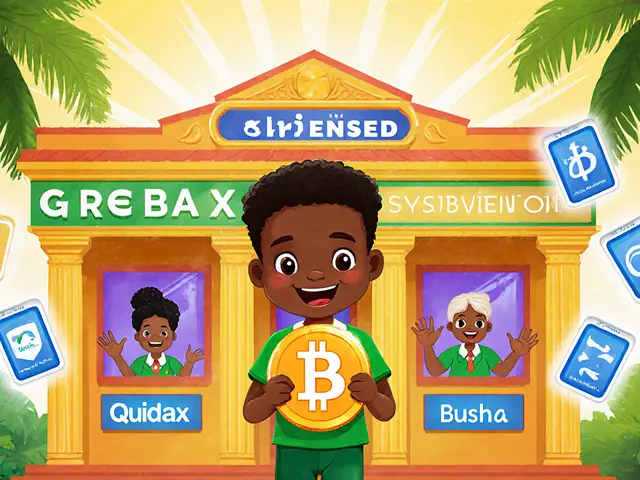For years, Nigerians were told crypto was illegal. Banks blocked transactions. Accounts got frozen. People turned to peer-to-peer markets just to buy Bitcoin. But things changed. On March 25, 2025, Nigeria’s president signed the Investments and Securities Act (ISA) 2025 - and suddenly, crypto wasn’t something to avoid. It became something to regulate.
So if you’re asking how to avoid crypto restrictions in Nigeria, the truth is: you don’t need to avoid them anymore. You need to work within them. The old days of hiding transactions or using unlicensed platforms are over. The new system is clear, structured, and enforced. The goal isn’t to bypass rules - it’s to use them to your advantage.
There Are No More Crypto Bans - Just Rules
The Central Bank of Nigeria (CBN) lifted its ban on crypto transactions in late 2023. That wasn’t a softening. It was a full policy reversal. Banks can now legally open accounts for licensed crypto businesses. That means you can deposit naira directly into your Quidax or Busha account - no more risky P2P trades with strangers in cafes.
The real shift came with the ISA 2025. It didn’t just legalize crypto. It classified digital assets as financial securities. That means every exchange, wallet provider, or trading platform operating in Nigeria must be registered with the Securities and Exchange Commission (SEC). Unlicensed platforms? They’re illegal. And enforcement is real.
So if you’re still using an app that doesn’t show a valid SEC license, you’re not avoiding restrictions - you’re breaking them. And the consequences? Your funds could be seized. Your identity flagged. Your bank account frozen again.
Only Use SEC-Licensed Platforms
Right now, only a few exchanges have passed the SEC’s vetting process. Quidax and Busha are the most established. Others are waiting in line. The SEC doesn’t rush approvals. They check everything: KYC systems, AML controls, server security, financial audits.
Here’s what you need to do:
- Go to the SEC Nigeria website and check the Registered Virtual Asset Service Providers list.
- Only sign up on platforms that appear there.
- Never trust an app that says “Nigeria-friendly” but has no SEC license number.
Some users complain the verification process takes too long. Yes, it does. But that’s the point. The old system let fraudsters slip through. Now, your identity is verified, your transactions are traceable, and your money is protected. If you want speed, you sacrifice safety. And in Nigeria’s new crypto environment, safety isn’t optional - it’s mandatory.
Banking Is Now Part of the System
Before 2024, Nigerian banks treated crypto users like criminals. Now, licensed exchanges have direct banking relationships. You can use your GTBank, Zenith, or Access account to fund your crypto wallet. No more sending money to strangers on WhatsApp.
Here’s how it works:
- Log into your SEC-licensed exchange.
- Select “Deposit Naira.”
- Choose your bank.
- Follow the prompts - it’s like paying a bill.
The money shows up in minutes. No intermediaries. No risk of chargebacks or scams. And when you sell crypto? The naira lands back in your account. This isn’t a workaround. It’s the official system.
If your bank still blocks crypto deposits, contact them. Ask for their compliance department. They’re now required to support licensed VASPs. If they refuse, file a complaint with the CBN’s Consumer Protection Unit.

Understand the 2026 Crypto Tax Rules
Starting January 1, 2026, crypto profits are taxable. But it’s not as scary as it sounds.
Here’s the breakdown:
- You only pay tax when you sell crypto for profit - not when you buy or hold.
- Individuals pay income tax between 7% and 25%, depending on your total earnings.
- Companies pay 20% to 30% corporate tax.
- All exchanges must charge 7.5% VAT on trading fees.
That means if you bought Bitcoin at ₦5 million and sold it for ₦8 million, you owe tax on the ₦3 million gain. Not on the full ₦8 million. And if you hold it for years? No tax until you sell.
Platforms like Quidax will soon provide annual tax reports. Keep your transaction history. Use a simple spreadsheet. Don’t wait until December to start tracking.
Don’t Fall for “Crypto Hacks” or VPN Tricks
You’ll see ads: “Use a VPN to bypass Nigeria crypto restrictions!” Or “Buy crypto with a foreign bank account!”
These are traps.
Using a VPN to access offshore exchanges doesn’t make you compliant. It makes you a target. The EFCC and NFIU now have access to telecom data. They can trace who’s using foreign platforms to move large sums. If you’re caught, you could face fines, account freezes, or even criminal charges.
And foreign bank accounts? Most require proof of income, residency, or business registration. If you’re just trying to dodge Nigerian rules, you’re not hiding - you’re exposing yourself.
The only safe path is the legal one: use SEC-approved platforms, keep records, pay taxes, and move within the system.

What About Decentralized Finance (DeFi)?
Right now, DeFi protocols like Uniswap or Aave aren’t regulated in Nigeria. That doesn’t mean they’re illegal - but they’re not protected either. If you lose funds on a DeFi platform, there’s no SEC to help you recover them.
Until the SEC expands its rules to cover DeFi, treat it like high-risk speculation. Don’t put in money you can’t afford to lose. Don’t assume it’s safer than centralized exchanges just because it’s “decentralized.” In Nigeria, the lack of regulation is the biggest risk.
The Future Is Regulated - Not Hidden
Nigeria isn’t trying to kill crypto. It’s trying to own it.
The country has the highest crypto search volume in Africa. Millions of young Nigerians use crypto to protect savings, send remittances, and start businesses. The government knows that. The ISA 2025 isn’t a crackdown - it’s a launchpad.
By working within the system, you’re not giving up freedom. You’re gaining stability. Your money is protected. Your transactions are clear. You can bank, trade, and invest without fear.
The days of hiding are over. The era of playing by the rules has begun. And for Nigerians who want to use crypto without risk, that’s the best outcome possible.
Is it still illegal to trade crypto in Nigeria?
No, it’s not illegal. Since March 2025, crypto is legal and regulated under the Investments and Securities Act (ISA) 2025. All trading must happen through SEC-licensed platforms. Unlicensed exchanges are banned, but using approved ones is fully legal.
Can I use my Nigerian bank account to buy crypto now?
Yes. Since late 2023, the Central Bank of Nigeria allows licensed crypto exchanges to connect directly with Nigerian banks. You can deposit and withdraw naira through GTBank, Zenith, Access, and others - as long as you’re using a platform registered with the SEC.
What happens if I use an unlicensed crypto app in Nigeria?
You risk losing your funds and facing legal consequences. Unlicensed platforms have no oversight. If they shut down or get hacked, there’s no recourse. The EFCC and NFIU are actively tracking users of illegal platforms. Your bank account could be frozen, and you may be investigated for financial misconduct.
Do I have to pay tax on my crypto profits in Nigeria?
Yes, starting January 1, 2026. Crypto profits are taxed as income. Individuals pay between 7% and 25% on gains, depending on total earnings. Companies pay 20%-30% corporate tax. You only pay tax when you sell or exchange crypto for profit - not when you hold it.
Is DeFi safe to use in Nigeria?
Not yet. DeFi platforms like Uniswap or Aave aren’t regulated by the SEC. If you lose funds, there’s no legal protection. These platforms are high-risk and not recommended for beginners. Stick to SEC-licensed exchanges until DeFi regulation is clearly defined.
How do I know if a crypto platform is SEC-licensed?
Visit the official SEC Nigeria website and check the list of Registered Virtual Asset Service Providers. Only platforms listed there are legal. Look for their license number on the app or website. If it’s not there, assume it’s not approved.


Drew Monrad
November 14, 2025 AT 10:22This is the most naive piece of propaganda I've read all year. The government doesn't 'own' crypto - they're just trying to tax it into oblivion while pretending they're helping. You think they care about your 'stability'? They care about control. And guess what? The moment you comply, you become a data point in their surveillance machine. Wake up.
sandeep honey
November 14, 2025 AT 19:59I've been using Quidax since 2023. The KYC took 3 days. Not fast, but worth it. My bank account hasn't been frozen once since I switched. If you're still using unlicensed apps, you're playing Russian roulette with your life savings. This isn't censorship. It's protection.
anthony silva
November 14, 2025 AT 22:43So now we're supposed to be grateful the government finally stopped treating us like criminals... after 5 years of freezing accounts and shaming us? Cool. I'll take my compliance and my 25% tax rate and go cry in the corner. Thanks for the handout.
Sara Lindsey
November 16, 2025 AT 01:48This is actually huge. For the first time, Nigerian crypto users have real legal footing. No more hiding. No more sketchy P2P deals. You can finally bank like a normal person. The system is slow but it's working. Don't fight it. Use it. Build with it. The future is here and it's regulated.
alex piner
November 16, 2025 AT 07:54i just want to say thank you for this. i was so scared to even look at crypto after my account got frozen in 2022. now i feel like i can breathe again. the process is kinda annoying but at least im not breaking the law anymore. keep it up!
Gavin Jones
November 16, 2025 AT 16:10One must acknowledge the structural integrity of this regulatory framework. The convergence of banking infrastructure with licensed VASPs represents a paradigmatic shift in financial sovereignty. The Nigerian state has, in a remarkably pragmatic gesture, chosen institutional integration over prohibition. A model worth emulating.
Mauricio Picirillo
November 17, 2025 AT 17:14I know some folks are mad about the taxes, but honestly? If you're making real money off crypto, paying tax is just part of being grown up. I started tracking my trades in a Google Sheet last year. Took me 20 minutes. Now I'm chill. No panic in December.
Liz Watson
November 18, 2025 AT 01:43Oh wow. So now we're supposed to be thrilled that the government finally stopped actively trying to destroy us? Congratulations, you gave us back the right to be taxed. What a victory. I'm sure the EFCC will be so gentle when they come knocking for my 25%.
Rachel Anderson
November 18, 2025 AT 15:59I cried when I saw the SEC list. After all the sleepless nights, all the WhatsApp scams, all the friends who lost everything... this is the first time I feel safe. Not rich. Not powerful. Just safe. And that's more than I ever thought I'd get.
Hamish Britton
November 19, 2025 AT 10:56Been using Busha since last year. The deposit process is smooth. My bank didn't even blink. Honestly? The biggest change isn't the law. It's the peace of mind. No more looking over my shoulder when I open the app.
Robert Astel
November 21, 2025 AT 05:58You know what's funny? People think regulation is the enemy of freedom but the truth is the unregulated space was always the trap. The real freedom is knowing your money won't vanish because some guy in a basement ran off with your ETH. The SEC isn't taking your freedom. They're just making sure the playground isn't full of quicksand.
Andrew Parker
November 22, 2025 AT 16:54I just want to say... *sniff*... this is the most beautiful thing I've seen in years. The government finally sees us. They see our dreams. Our late-night trades. Our 3am panic sells. They're not our enemies. They're our guardians. 💔🙏 I'm not crying, you're crying.
Kevin Hayes
November 24, 2025 AT 16:51The ISA 2025 is not a gift. It is a recognition of economic reality. Nigeria's crypto adoption rate exceeds 32%. To ignore it was economically irrational. To regulate it is statecraft. The tax structure is progressive, the compliance mechanisms are transparent, and the enforcement is proportionate. This is not oppression. It is governance.
Katherine Wagner
November 25, 2025 AT 05:43So... you're saying if I use an unlicensed app... I could get arrested? But what if I use a VPN? Or... what if I just... don't tell anyone? Like... maybe if I don't say it out loud... it's not real?
ratheesh chandran
November 26, 2025 AT 09:31This is all just a distraction. The real issue is the Naira's collapse. Crypto isn't the solution. It's the symptom. They're giving us a shiny new cage and calling it freedom. The banks still control the gates. The government still owns the keys. We're not free. We're just better at pretending.
Hannah Kleyn
November 27, 2025 AT 10:17I've been holding since 2021. I didn't sell a single coin during the 2022 crash. I didn't panic. I didn't chase pumps. I just waited. Now I can finally move my crypto into my bank account without feeling like I'm committing a crime. It's not about the money anymore. It's about being able to exist without fear.
gary buena
November 27, 2025 AT 23:32I tried to use a foreign exchange last month. Got flagged by my bank. They called me. Asked if I knew I was using an unlicensed platform. I said yes. They said 'good, then you know the risk.' Then they unblocked my account for Quidax. I didn't even have to file a complaint. That's how far we've come.
Vanshika Bahiya
November 28, 2025 AT 09:56I teach crypto to students in Lagos. Before ISA 2025, I had to whisper. Now I show them the SEC website. I tell them: 'This is your future. Use it right.' One girl just opened her first account yesterday. She's 16. She's going to be the first crypto lawyer in Nigeria. This is bigger than money.
Albert Melkonian
November 29, 2025 AT 09:26The transition from prohibition to regulation represents a profound evolution in financial policy. The state's decision to classify digital assets as securities aligns Nigeria with global best practices. The inclusion of VAT on trading fees, while burdensome, ensures fiscal sustainability. This is not merely compliance. It is institutional maturation.
Kelly McSwiggan
November 29, 2025 AT 20:18Let me guess. The SEC is going to send you a cute little PDF with your 'tax report' in January 2026. And you'll be so proud you didn't use a VPN. Meanwhile, the real investors are moving to Dubai. The people who actually built wealth? They left. You're just the last one cleaning up the mess.
Becky Shea Cafouros
December 1, 2025 AT 04:18I'm American. I don't live in Nigeria. But I've watched this whole thing unfold. What you're seeing isn't regulation. It's the slow, painful birth of a financial identity. You're not just getting rules. You're getting legitimacy. That's worth more than any tax break.
Mandy Hunt
December 3, 2025 AT 00:45The SEC is a front. The EFCC already has all your data. Your bank account, your phone, your WhatsApp. They're not protecting you. They're building a database. Wait till they start freezing accounts for 'suspicious behavior' even if you're compliant. They always do. This is just the calm before the storm.
David Cameron
December 3, 2025 AT 21:22The real question isn't whether crypto is legal. It's whether we're ready to be responsible. The system gave us tools. Now we have to use them with discipline. Not to avoid punishment. But to build something lasting. That's the real test.
Cody Leach
December 5, 2025 AT 02:04Just got my first tax report from Quidax. Clean. Clear. No guesswork. I printed it. Filed it. Felt weirdly proud. This isn't perfect. But it's the first time I've ever felt like my crypto activity had dignity. That's worth something.